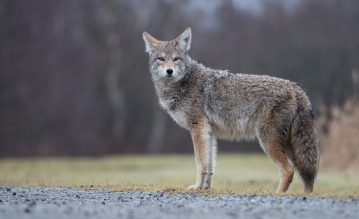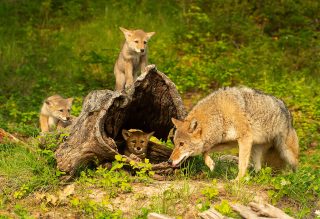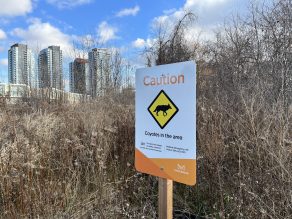Be cautious as coyote mating season begins in Mississauga
City services | January 20, 2023
Coyote mating season starts in January, and by February, they usually begin their search for mates. This is the time when coyotes are more active, and you might come across them while they are looking for their partners. You may also hear them communicate with each other through howling and yipping, as they establish their territories.
Coyote mating season
In a coyote pack, only the breeding pair can mate, while others help with various tasks such as caring for newborns, hunting, guarding, and defending the pack’s territory. Coyote pups are typically born from late March to April, with an average litter size of four to six.
Pups are born blind and spend about four to five weeks in the den. They are fully weaned after a month and outgrow their den by the twelfth week. Within a year, they reach their full size.
Coyotes in the urban ecosystem
Coyotes have a vital role to play in the urban ecosystem as they help control the population of rodents and other wildlife. During pup-rearing season, you may spot coyotes foraging during the day as they need more food. They are always on the move, searching for their next meal. They are opportunistic eaters and will consume whatever is readily available, including rats, mice, squirrels, raccoons, nuts, and berries. Coyotes are often attracted to communities that offer a good source of food and shelter.
Although rare, incidents involving humans and coyotes may occur more frequently during mating season. Pet owners should be cautious as pets are more likely to be involved in such incidents. During this time, coyotes are more visible, protective, and may display a more aggressive or bold behaviour to fend off potential threats and dangers to their pups and territory.
Encountering a coyote
If you come across a coyote near its den, it might try to escort you to a safe distance. You might observe that it hunches its back, approaches you, or emits a series of yips, barks, or huffs. In such situations, it’s best to slowly leave the area and keep small pets close to you. Coyotes perceive pets, particularly dogs, as potential threats, so ensure that you never leave your pets unsupervised and off-leash, especially at night. Avoid using retractable leashes that allow your pets to roam, and refrain from leaving your pets alone in your backyard.
It’s possible to coexist with coyotes safely throughout the year by being aware and following some basic guidelines. Avoid approaching, harassing, or interacting with coyotes and maintain a safe distance from them. It’s also important to steer clear of dens and pups to avoid any unwanted confrontation with the adult coyotes.
Report sightings
Have you spotted a coyote in your area? You can report such sightings on the City’s online map designed for this purpose. Your report will help Animal Services identify areas that require additional patrols and community outreach efforts.
In case you come across a coyote that appears to be sick, injured, or is not maintaining a safe distance, please contact Mississauga Animal Services at 905-896-5858.
More information
To gain a deeper understanding of Animal Services and urban wildlife, you can visit mississauga.ca/animalservices.
Tags
Media contact
City of Mississauga Media Relations
media@mississauga.ca
905-615-3200, ext. 5232
TTY: 905-896-5151


